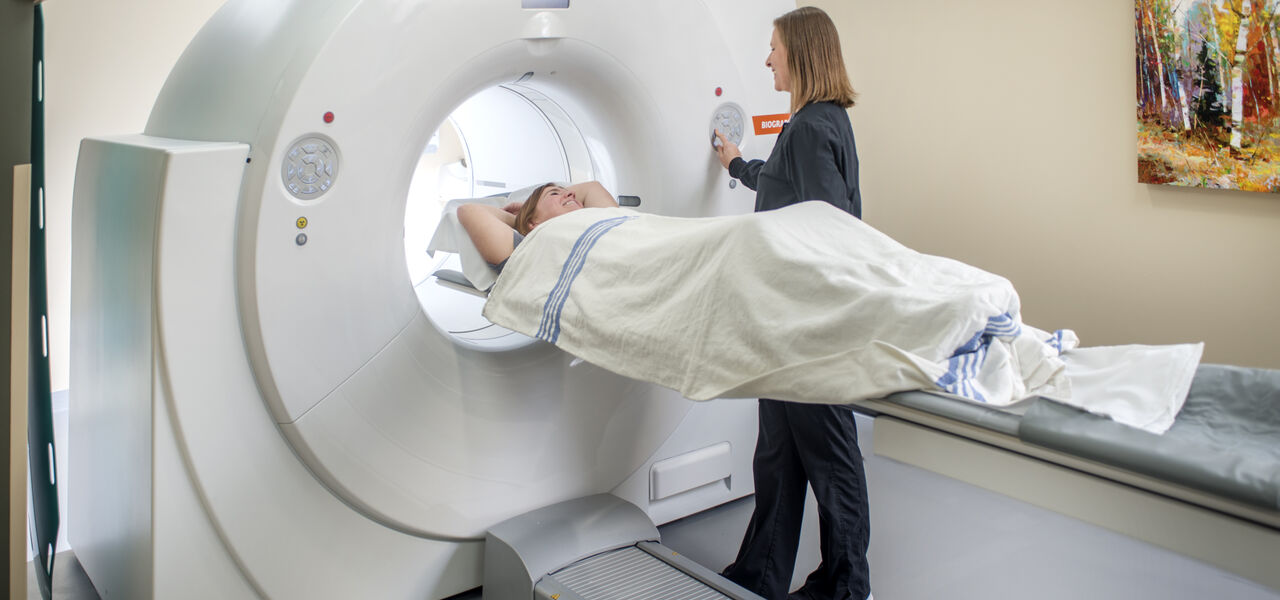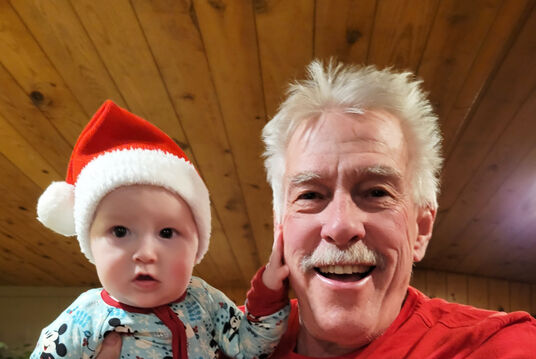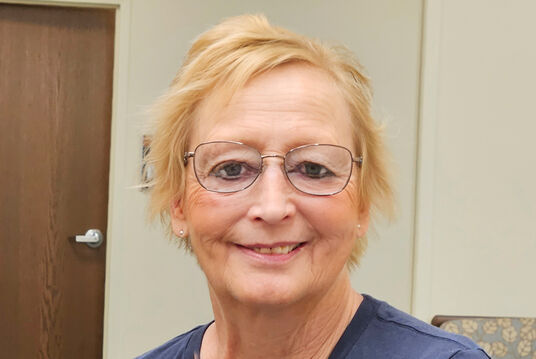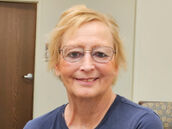

What is Nuclear Medicine?
The small amounts of radiopharmaceuticals are introduced into the body by injection, inhalation, or swallowing depending on the exam. A gamma camera is then used to take the images. The amount of radiation received from a nuclear medicine procedure is comparable to that of a diagnostic x-ray.
Pregnancy or Nursing Precautions
If you are pregnant or think you may be pregnant, please tell your physician. The nuclear medicine technologist and the Radiologist will need to be made aware if a patient is pregnant or nursing before beginning the procedure.
After your test
You may return to your normal diet and activities after your nuclear medicine exam has been completed. The Radiologist will interpret the exam and the results will be sent to the ordering physician. If you have questions about your procedure or cannot keep your appointment date/time, please call scheduling staff at 402-460-5884. There are many different nuclear medicine procedures. Listed below are some of the most commonly performed exams:
- Bone Scan
- Three Phase Bone Scan
- Gallbladder (HIDA)
- Gastric Emptying Study
- Lung Ventilation and Perfusion (V/Q Scan)
- Thyroid Uptake and Scan
- Parathyroid
- Nuclear Medicine Stress Test
- PET/CT
- PSMA PET/CT
- DOTATATE PET/CT
- SPECT/CT
Bone Scan
Prep: There is no preparation required for this exam, However, if you have other exams scheduled on the same day, follow the prep needed for those exams.
Procedure:
- Injection will be given directly into a vein, via an IV site, or into a port.
- There are no reactions or side effects from the radioactive material.
- After injection, you will return for imaging after 3 hours. (i.e. If injection is at 10 a.m. the patient will need to be back at 1 p.m.)
- You will be able to leave the hospital between the injection and the imaging, and there are no restrictions during that time. However, we would like you to drink plenty of fluids during the break.
- Just prior to your imaging the nuclear medicine technologist will ask you to empty your bladder.
- You will lie on your back for the imaging with a camera above and below you.
- The table will move slowly allowing imaging from the head to toe, unless otherwise specified.
- Imaging takes approximately 30 minutes.
Three Phase Bone Scan
Prep: There is no preparation required for this exam. However, if you have other exams scheduled on the same day, follow the prep needed for those exams.
Procedure:
- Injection will be given directly into a vein, via an IV site, or into a port.
- There are no reactions or side effects from the radioactive material.
- Imaging will begin over the area of concern as the injection is given. This portion of the exam can take up to 30 minutes.
- After this portion, you will need to return 3 hours after the injection for further imaging.
- You will be able to leave the hospital between the injection and the imaging, and there are no restrictions during that time. However, we would like you to drink plenty of fluids during the break.
- Just prior to your imaging the nuclear medicine technologist will ask you to empty your bladder.
- You will lie on your back for the imaging with a camera above and below you.
- The table will move slowly allowing imaging from the head to toe, unless otherwise specified.
- Imaging takes approximately 30 minutes.
- Additional images may be taken over the area of concern. Each additional image takes 5 minutes.
Gallbladder (HIDA) Scan
Prep: You may not have any food, drink, tobacco products, or medications after midnight. Precaution: Please let the nuclear medicine technologist know if you are allergic to Morphine.
Procedure:
- An IV will be started in your arm for the injection of the radiopharmaceutical.
- There are no reactions or side effects to this material.
- You will lie on your back with the camera above you for imaging.
- Imaging will take about an hour and a half to two hours.
Gastric Emptying Study
Prep: Nothing by mouth after midnight. This includes food, drink, tobacco products, gum, and medications.
Procedure:
- This test is done at different time increments.
- Upon your arrival a scrambled egg will be prepared with a small amount of radiopharmaceutical mixed in.
- You will be given the scrambled egg to eat.
- Immediately after eating the egg, the imaging will begin.
- You will lie on your back with the camera above and below your abdomen.
- Imaging will take 1 hour for this first portion of the test.
- You will have additional images done at 2 hours and at 4 hours. These images will be shorter than an hour.
- Example: Test starts at 9:00 a.m. Imaging from 9:00 a.m. to 10:00 a.m. Patient comes back at 11:00 a.m. for imaging and also 1:00 p.m.
- You MUST remain NPO (nothing by mouth) during the entire exam. Therefore, nothing to eat or drink, no tobacco products, medications, or gum during the break times.
Lung Ventilation and Perfusion (V/Q Scan)
Prep: There is no preparation for this exam, however if you have other exams scheduled on the same day, follow their preparation guidelines.
Procedure: This is usually a two part test:
Ventilation
- You will inhale a small amount of radioactive gas through a mouthpiece or mask.
- You will need to breathe through the mouthpiece with a clip on your nose, or through the mask that covers both your nose and mouth. The radioactive gas will clear from your lungs as you breathe.
- You will lie on your back with cameras above and below our chest.
- This portion of the test takes approximately 10 minutes.
Perfusion
- You will be given an injection into a vein or an IV started in your arm.
- Imaging will begin right away.
- You will lie on your back with the cameras above and below your chest.
- There are four sets of images with each set taking about 5 minutes a piece.
- The camera will reposition around the table for the different views.
- This portion of the test takes approximately 20 minutes.
Thyroid Uptake and Scan
Prep: There is no preparation for this exam, however if you have other exams scheduled on the same day, follow their preparation guidelines. Inform your physician if you are on any thyroid medications. Some thyroid medications need to be held before this exam can be performed. Also inform your physician or the nuclear medicine technologist if you have had a procedure involving x-ray contrast in the past 5 weeks. This includes CT scans and heart catheterizations.
Procedure: This exam is a two day procedure.
Day One
- You will be given a capsule to swallow that contains the iodine radiopharmaceutical.
- This part of the exam will take about 10 minutes.
- You have no restrictions following this portion.
Day Two
- The nuclear medicine technologist will have you sit in a chair and will take counts of your neck and leg for two minutes each.
- After the counts, you will lie on your back with the camera above your neck.
- Up to four images will be taken with the camera in different positions.
- This portion of the test takes approximately 40 minutes.
Parathyroid
Prep: There is no preparation for this exam. However if you have other exams scheduled on the same day, follow their preparation guidelines.
Procedure:
- You will be given an injection of the radiopharmaceutical directly into a vein or via an IV started in your arm.
- There will be a 15-minute wait before the first set of images.
- You will lie on your back with the camera above your neck for the imaging.
- The imaging will consist of a five-minute image with the camera above you, a 35 -minute image where the camera rolls around you and then a short low-dose CT scan.
- You will return two hours after your injection for the final set of images.
- You may leave the hospital during the break. There are no restrictions during that time.
- For the second set of images, you will again lie on your back with the camera above your neck.
- The imaging will be the same as the first set.
Nuclear Medicine Stress Test
Prep: A cardiac nurse will try and contact you prior to the day of your study to go over the complete preparation. Do Not eat or drink after midnight. Avoid alcohol, tobacco, caffeinated beverages and chocolate after 4 pm the day before the exam.
Procedure: This is a two part test with a resting portion and a stress portion.
Resting Portion
- An injection of the radiopharmaceutical will be given through and IV started in your arm.
- There is a 1 hour wait time before your resting images.
- You will lie on your back with your arms above your head for the imaging.
- The camera will rotate around your chest taking images the whole time.
- These images take approximately 10-15 minutes.
- It is very important to hold still during the imaging.
Stress Portion
- The stress portion of the test will be done using a medication or with exercise on a treadmill
- Imaging will also be done following the stress portion.
- Imaging following the stress portion is the same as for the resting portion.
PET/CT
PET stands for Positron Emission Tomography and is a type of molecular imaging that uses a small amount of radioactivity to show how the body is functioning on a cellular level. CT stands for Computed Tomography and is a type of X-ray that can show cross-sectional images of the anatomy.
The PET/CT exam combines the two types of imaging into a single set of images. This can provide detail on both the anatomy and function of organs and tissues, enabling physicians to diagnose and identify disease more accurately.
Is PET/CT safe?
A PET/CT scan is extremely safe. There are no known side effects to the radiopharmaceutical. The amount of radioactivity is small; it decays quickly and your body will eliminate any remaining material through your urine. There is no risk to other people you may interact with after the exam.
Please inform the technologist if you are pregnant or breastfeeding prior to your exam.
What to expect
A Nuclear Medicine staff member will contact you two days prior to your exam. If you have any questions regarding the exam, please call the Nuclear Medicine Department at 402-461-5271. Please check in at North Admissions 15 minutes prior to your scheduled exam time. A technologist will explain the procedure and go over any questions you may have.
We will start an IV, or have a nurse access your port, and will check your blood glucose level. You will receive an injection of a small amount of radioactivity. After the injection, you will be asked to relax in our Injection Room for one hour. We will have you use the restroom prior to your exam. During the imaging, you will lay on the exam table on your back.
The scan will take between 20 and 45 minutes. It is very important for you to remain still during the imaging. Plan on the entire procedure taking two to three hours total.
After your exam
We encourage you to drink plenty of water, or other fluids, throughout the day.
Your results
The results will be reported to your referring physician. The physician’s office will contact you with your results.
How to prepare for a FDG PET/CT
- Patient preparation is important for controlling your blood glucose readings. High blood glucose can interfere with the accuracy of your exam.
- Avoid caffeine and strenuous activity 24 hours prior to your exam (heavy lifting, vigorous exercise, working out, etc.).
- Follow a low carbohydrate/high protein diet 24 hours prior to your exam. Please avoid sugary and starchy foods (breads, pasta, potatoes, cereals, desserts, candy and fruit.).
- Do not eat or drink anything except plain water for six hours prior to your exam. This includes sugar-free gum, mints and any beverages other than plain water.
- Parenteral feedings should also be withheld for six hours prior to your exam.
- No nicotine or alcohol 12 hours prior to your exam.
- You may take morning medications that can be taken without food. Please do not take vitamins or syrup-based medications until after your exam.
- Dress comfortably and warmly. Our imaging rooms can be cool. Try not to wear things with metal (i.e., belts, zippers, buttons and underwire bras).
- Try to drink extra water the day of the exam.
- If you have diabetes, do not take insulin for four hours prior to your exam.
- If you are pregnant or breastfeeding, please inform your physician and the technologist prior to your exam.
If you have diabetes
- Type I Diabetes
- Take your usual insulin doses the day before your PET/CT scan. On the morning of the exam, hold all insulin until your test is complete.
- Type II Diabetes
- If you take the oral medications Metformin or Thiazolidinediones (Actos), please take these medications at your normal time.
- If you are taking oral medications sulfonylurea, insulin secretagogues or insulin, you should hold your diabetes medication/insulin until after your PET/CT exam. After your test, you can take your medication/insulin with a meal.
- Please check your blood glucose level in the morning. If your blood glucose is:
- Below 200 mg/dL, go to your appointment as scheduled.
- Below 70 mg/dL, or you have symptoms of hypoglycemia, treat your low blood glucose in your usual way. Do not let low blood glucose go untreated. Call to reschedule your scan.
- Above 200 mg/dL, call us. We may need to reschedule your scan.
- Patients using a continuous insulin infusion/pump
- Keep your insulin pump on the night/basal setting until after your PET/CT scan.
- Patients with a continuous glucose monitor
- If possible, we will try to coordinate scheduling of your PET/CT exam around the time of your continuous glucose monitor (CGM) change.
PSMA PET/CT
A Prostate-Specific Membrane Antigen is a protein found on the surface of most prostate cancer cells. The PSMA PET/CT scan uses a radioactive molecule that binds to the PSMA protein. The scan detects the concentrated PSMA tracer, helping to pinpoint these tumors for more effective treatment.
Is PSMA-PET right for every prostate cancer patient?
The current FDA approval is for two main groups of patients:
- High-risk men before treatment with prostatectomy or radiation therapy
- Men who have already been treated for localized prostate cancer who have a rising PSA
How to prepare for your PSMA PET/CT exam:
- Unlike FDG PET scans, there are no special restrictions, diet, or preparation for the PSMA PET scan.
- You may take your medications per your normal routine.
- If you are diabetic, take your diabetic medications and maintain your normal dietary patterns per your doctor’s instructions.
- Dress comfortably and warmly. Our imaging rooms can be cool. Try not to wear things with metal. (i.e., belts, zippers, and buttons)
- Try to drink extra water the day of the exam.
DOTATATE PET/CT
A DOTATATE PET/CT scan provides physiologic imaging and assists in disease localization for somatostatin receptor (SSTR) positive neuroendocrine tumor (NET) patients.
How to prepare for your DOTATATE PET/CT exam:
- Unlike FDG PET scans, there are no special diet restrictions for the DOTATATE PET scan.
- Hold short acting somatostatin analogs for 2 days.
- Hold long-acting somatostatin analogs for 28 days. We will try to schedule your scan 1-2 days before your next long-acting somatostatin injection.
- Patients should consult their physician before withholding any medication.
- You may take other medications as per your normal routine.
- If you are diabetic, take your diabetic medications and maintain your normal dietary patterns as per your doctor’s instructions.
- Dress comfortably and warmly. Our imaging rooms can be cool. Try not to wear things with metal. (i.e., belts, zippers and buttons)
- Try to drink extra water the day of the exam.





